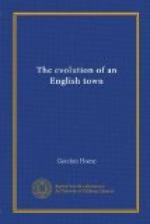CHAPTER XII
The Forest and Vale from Early Victorian Times to the Present Day
A.D. 1837 to 1905
This most recent stage in the development of Pickering is marked by the extinction of the few remaining customs that had continued to exist since mediaeval times. One of the most hardy of these survivals was the custom of “Riding t’ fair,” as it was generally called. It only died out about twenty years ago when the Pickering Local Board purchased the tolls from the Duchy of Lancaster, so that it has been possible to obtain a photographic record of two of the Duchy tenants who used to take part in the ceremony. On market mornings the Steward of the Duchy armed with a sword in a richly gilt scabbard would repair to the castle on horseback, where he would be joined by two freeholders of Duchy land, also mounted; one carrying the antique halbert and the other the spetum that are now preserved in a solicitor’s office in Eastgate.[1] They would then ride down to the top of the market-place, where the steward would take out of his pocket a well-worn piece of parchment and read the following proclamation.
“O’yes! O’yes! O’yes!
“Our Sovereign Lady the Queen and the Reverend John Richard Hill, Lord of this Manor, proclaim this fair by virtue of Her Majesty’s writ of ad quod Damnum, for establishing the same for buying and selling of horses, geldings, cattle, sheep, swine, and all sorts of merchandise brought here to be sold, and do hereby order and direct a court of Pye Powder to be held at the house of Robert Simpson, where all matters in Difference will be heard and determined according to Law and Justice, and that no person do presume to buy or sell anything but between the rising and setting of the Sun, and they do strictly charge and command all persons to be of good behaviour during the continuance of this Fair.
“God save the Queen and the Lord of the Manor.”
[Footnote 1: Mr Arthur Kiching’s office. The sword is kept by Mr Boulton.]
[Illustration: THE OLD CUSTOM OF RIDING T’ FAIR AT PICKERING.
Two of the Duchy tenants carrying the halbert and spetum as they used to appear when the market proclamation was read. ]
[Illustration: THE HALBERT (7 feet long) and SPETUM (6 feet 2 inches) that were carried by the men who accompanied the Steward of the Duchy when he declared the markets open.]
The parchment is now in the possession of the present steward of the Duchy property, Mr J.D. Whitehead, who was appointed in 1887 and was the last to read the proclamation. From the market-place the steward with his armed attendants rode to the east end of Hungate, and to one or two other points in the town, reading the proclamation at each place.
The Court Leet, or, as its full title appears, the Court Leet, View of Frank Pledge, Court Baron, Copy-hall and Customary Court of the Castle Manor and Honour of Pickering, still meets every second year in October or November. Twenty-seven out of thirty-eight townships used to be represented by a constable and four men. Appointed annually and with much solemnity were the following list of officials:—




